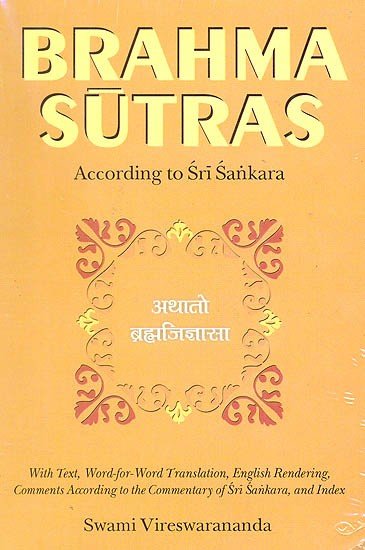Brahma Sutras (Shankara Bhashya)
by Swami Vireshwarananda | 1936 | 124,571 words | ISBN-10: 8175050063
This is the English translation of the Brahma-sutras including the commentary (Bhashya) of Shankara. The Brahma-sutra (or, Vedanta-sutra) is one of the three canonical texts of the Vedanta school of Hindu philosophy and represents an early exposition the Vedantic interpretation of the Upanishads. This edition has the original Sanskrit text, the r...
Chapter II, Section II, Adhikarana V
Adhikarana summary: Refutation of the Bauddha Idealists
Brahma-Sutra 2.2.28: Sanskrit text and English translation.
नाभावः, उपलब्धेः ॥ २८ ॥
nābhāvaḥ, upalabdheḥ || 28 ||
na—not; abhāvaḥ—non-existence; upalabdheḥ—on account of their being experienced.
28. Non-existence (of things external) is not (true), on account of their being experienced.
From this Sutra begins the refutation of the Idealists among the Bauddhas, according to whom only ideas exist and nothing else.
According to them the external world is nonexistent. Does it mean that the objective world is absolutely non-existent like the horns of a hare, or does it mean that it is unreal even as the world seen in a dream is unreal. The Sutra refutes the former view. In that case we could not have experienced it. The external world is an object of experience through the senses, and cannot therefore be altogether non-existent like the horns of a hare. The Buddhist may say that he does not affirm that he is conscious of no object, but only that what is seen in his consciousness alone shines as something external. But then the very nature of consciousness itself proves the existence of external things different from consciousness, for men are conscious of things or objects of perception, and nobody is conscious of his perception merely. The very fact that the Bauddhas say that the internal cognition appears ‘as something external’ shows that the external world is real. If it were not real, the comparison ‘like something external’ would be meaningless. No one says that Devadatta is like the son of a barren woman.
Brahma-Sutra 2.2.29: Sanskrit text and English translation.
वैधर्म्याच्च न स्वप्नादिवत् ॥ २९ ॥
vaidharmyācca na svapnādivat || 29 ||
vaidharmyāt—Owing to the difference of nature; ca—and; na—is not; svapnādivat—like dreams etc.
29. And owing to the difference of nature (in consciousness between the waking and the dream state, the experience of the waking state) is not like dreams etc.
This Sutra refutes the alternative view given in the previous Sutra. The Bauddhas may say that perception of the external world is to be considered similar to dreams and the like. In a dream there are no external objcts; yet the ideas appear in a twofold form as subject and object. The appearance of an external world is similarly independent of any objective reality. This Sutra refutes that view. There is a difference between the dream state and the waking state. What is seen in a dream is contradicted by waking experience, it is unreal. The dream state is a kind of memory, but the waking state is a real perception; so it cannot be rejected as untrue. Moreover, what is the proof of the existence of consciousness except experience? If that is so, why should not an object which is experienced be taken also as existing ? It may be said that even the Vedantins acknowledge the unreality of the external world, since it is contradicted by the knowledge of Brahman, and that this view is based on the Srutis. But if the Bauddhas accept the authority of the Vedas, then they would be included within the Vedantic school and no longer remain outside it, but as a matter of fact they do not accept the Vedas.
Brahma-Sutra 2.2.30: Sanskrit text and English translation.
न भावः, उनुपलब्धेः ॥ ३० ॥
na bhāvaḥ, anupalabdheḥ || 30 ||
na—Is not; bhāvaḥ—existence; anupalabdheḥ—because (external things) are not experienced.
30. The existence (of Samskaras) is not (possible according to the Bauddhas), because (external things) are not experienced.
The Bauddhas say that though external things do not exist, yet the actual variety of notions like pot, cloth, etc. can be accounted for by the preceding Samskaras or mental impressions left by previous experience, even as the impressions of the waking state give rise to the variety of experience in the dream state. This view is not tenable, says the Sutra, for mental impressions are impossible without the perception of external objects, and this the Bauddhas deny. The assumption of a beginningless series of mental impressions as cause rnd effect would only lead to a regressus in infinitum and not solve the difficulty.
Brahma-Sutra 2.2.31: Sanskrit text and English translation.
क्षणिकत्वाच्च ॥ ३१ ॥
Kṣaṇikatvācca || 31 ||
Kṣaṇikatvāt—On account of the momentariness; ca—and.
31. And on account of the momentariness (of the ego-consciousness it cannot be the abode of the Samskaras).
The mental impressions must have an abode. Without that they cannot exist. But the doctrine of momentariness denies permanency to everything. Even the Alayavijnana or ego-consciousness, is momentary and cannot be that abode. Unless there is a permanent principle connecting the past, present, and future, there cannot be remembrance or recognition of an experience originating at a particular time and place. If the Alayavijnana is said to be something permanent, then that would go counter to the doctrine of momentariness.
Brahma-Sutra 2.2.32: Sanskrit text and English translation.
सर्वथानुपपत्तेश्च ॥ ३२ ॥
sarvathānupapatteśca || 32 ||
sarvathā—In every way; nupapatteḥ—being illogical; ca—and.
32. And (as the Bauddha system is) illogical in every way (it cannot be accepted).
This Sutra can also be interpreted as refuting the Nihilists: The translation would then be : And (as Nihilism) is illogical etc.
Nihilism of the Bauddhas goes counter to everything. It goes against the Sruti, the Smriti, perception, inference, and every other means of right knowledge and so has to be entirely disregarded by those who are mindful of their welfare.
